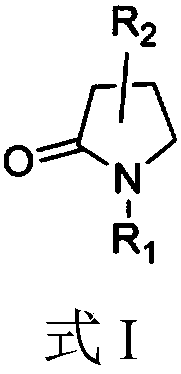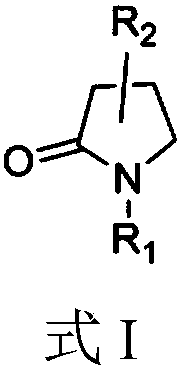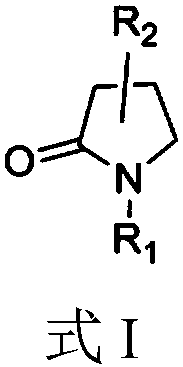Inorganic nanometer material printing ink, preparation method and applications thereof
A technology of inorganic nanomaterials and printing inks, applied in inks, applications, household appliances, etc., can solve the problems of comprehensive stability of printing ink volatilization rate, dispersibility, viscosity, surface tension, etc. Hydrophobic stability and dispersion performance, effect of simple method
- Summary
- Abstract
- Description
- Claims
- Application Information
AI Technical Summary
Problems solved by technology
Method used
Image
Examples
preparation example Construction
[0058] Correspondingly, an embodiment of the present invention provides a method for preparing an inorganic nanomaterial printing ink, comprising the following steps:
[0059] S01. Provide inorganic nanomaterials and organic solvents, wherein the organic solvents contain at least one pyrrolidone organic solvent;
[0060] S02. Dissolving the inorganic nanomaterials in an organic solvent to form the inorganic nanomaterial printing ink.
[0061] The preparation method of the inorganic nanomaterial printing ink provided in the embodiment of the present invention only needs to dissolve the inorganic nanomaterial in an organic solvent containing a pyrrolidone solvent with a specific structure. The operation is simple and easy to control, and does not require harsh conditions. Realize mass production.
[0062] Specifically, in the above step S01, the type of the pyrrolidone-based organic solvent can be referred to above. Specifically, the organic solvent contains at least one pyrrol...
Embodiment 1
[0075] An inorganic nanomaterial printing ink, comprising oleylamine-stabilized quantum dots, organic solvents and auxiliary reagents, wherein the mass ratio of the oleylamine-stabilized quantum dots to the organic solvent is 15:85; the organic solvent is represented by weight percent The composition of dodecane and N-methylpyrrolidone is 50:35, and the dodecane and N-methylpyrrolidone are both dehydrated and deoxygenated to a purity greater than 99.9%; the auxiliary reagent is polypyrrole.
[0076] A method for preparing an inorganic nanomaterial thin film, comprising the following steps:
[0077] S11. Weigh each component according to the formula of the above-mentioned inorganic nanomaterial printing ink;
[0078] S12. Provide a 500mL single-necked flask, add oleylamine-stabilized red CdSe / ZnS quantum dots, dodecane, polypyrrole and N-methylpyrrolidone while stirring, and stir and mix for 30min to obtain a quantum dot ink composition;
[0079] S13. Inject the quantum dot in...
Embodiment 2
[0081] An inorganic nanomaterial printing ink, comprising oleylamine-stabilized quantum dots and an organic solvent, wherein the mass ratio of the oleylamine-stabilized quantum dots to the organic solvent is 10:90; the organic solvent is 20: 30:40 composition of dodecane, tetrahydronaphthalene and 1-dodecyl-2-pyrrolidone, and 1 dodecane, tetrahydronaphthalene and 1-dodecyl-2-pyrrolidone are all dehydrated, dehydrated Oxygen is refined to a purity greater than 99.9%.
[0082] A method for preparing an inorganic nanomaterial thin film, comprising the following steps:
[0083] S21. Weigh each component according to the formula of the above-mentioned inorganic nanomaterial printing ink;
[0084] S22. Provide a 500mL high-density polyethylene bottle, and in the case of stirring, add oleylamine-stabilized green CdZnSe / CdZnS, dodecane, tetrahydronaphthalene and 1-dodecyl-2-pyrrolidone in sequence, stir and mix for 30min, Obtain the quantum dot ink composition;
[0085] S23. The qu...
PUM
| Property | Measurement | Unit |
|---|---|---|
| Boiling point | aaaaa | aaaaa |
Abstract
Description
Claims
Application Information
 Login to View More
Login to View More - R&D
- Intellectual Property
- Life Sciences
- Materials
- Tech Scout
- Unparalleled Data Quality
- Higher Quality Content
- 60% Fewer Hallucinations
Browse by: Latest US Patents, China's latest patents, Technical Efficacy Thesaurus, Application Domain, Technology Topic, Popular Technical Reports.
© 2025 PatSnap. All rights reserved.Legal|Privacy policy|Modern Slavery Act Transparency Statement|Sitemap|About US| Contact US: help@patsnap.com



